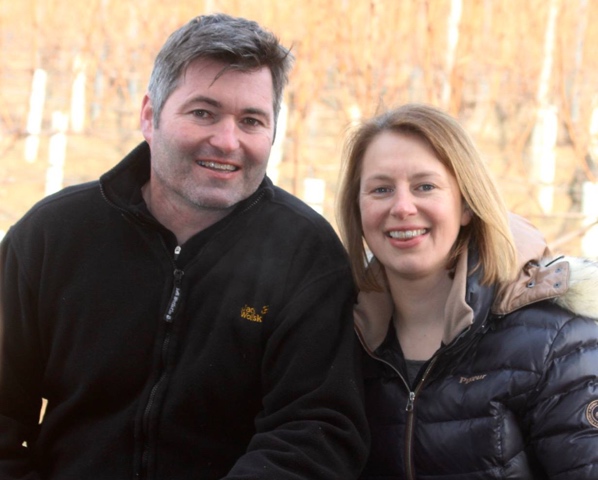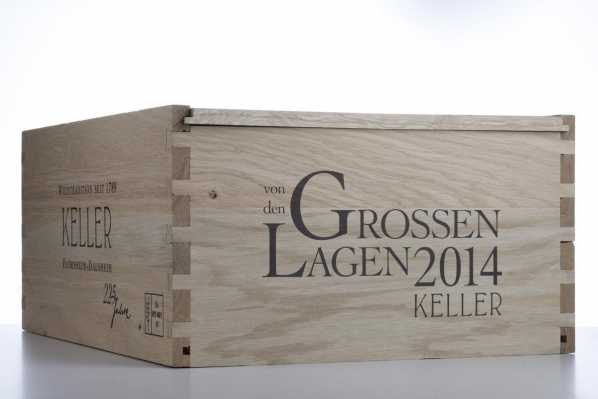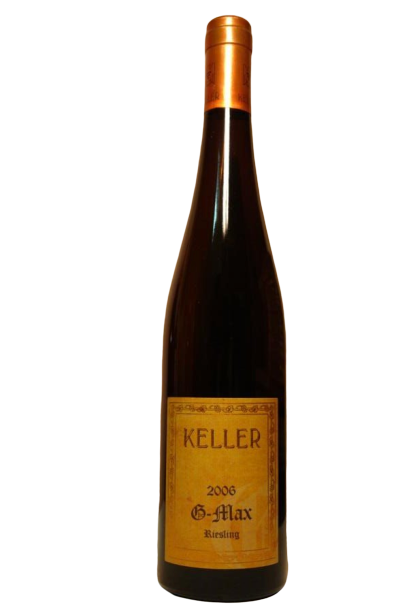
In the German wine region Rheinhessen the winery of the family Keller is at home. Here in Flörsheim-Dalsheim Johann Leonhard Keller found a new home around 1789, after he left Switzerland due to the French Revolution. Inspired by his fascination with agriculture and viticulture, he bought the so-called "Upper Hubacker", which is about four hectares in size, and still today mainly produces Müller-Thurgau, Blue Portuguese and of course Riesling. The somewhat unusual name Hubacker for this area actually comes from the term "hoof", which was around 1490 as a name for a piece of land of a certain size. The word "Huffe" became "Hube" at some point in the course of time and it remained so until today. The limestone-containing layers are ideal for viticulture and the old vines, which were once originally intended only for personal use, thank this even today with yields that Leonhard Keller probably would never have dreamed at the time. In 2000, the Keller family built a 6.5-meter-high and 4.2-meter-wide limestone tower there, which has since witnessed the special and uniqueness of this region.
Today it is Klaus Peter Keller with his family, who continues the winery according to traditional tradition. Meanwhile, about 18.5 hectares of vineyards are available. These are distributed in areas such as Morstein, Kirchspiel, Hipping and Pettenthal.The cultivated areas of the area of Morstein, whose name is actually derived from Marstein, which probably meant something like boundary stone, offers a cultivated area in 140 to 280 meters height. Here are mainly Riesling, Müller-Thurgau, Pinot Noir and Dornfelder cultivated. Apart from Klaus Peter Keller and Ms Julia, this area is also home to several farmed other wineries.
The cultivation site Hipping is part of the "Red Slope" and is located at 90 to 160 meters above sea level. The unique soils of red clay slate with limestone-containing substrate provide ideal growing conditions for the Riesling cultivated here and the Pinot Blanc Pinot Blanc flourishes splendidly. This location is also managed by various wineries.

The single vineyard Pettenthal, which comprises 31 hectares of cultivated land as part of the municipality of Nierstein, is the basis for varieties such as Riesling and Sauvignon Blanc due to its predominantly red clay slate.
Under the direction of Klaus Peter Kellers, since the year 2018, root-crops, ie non-refined vines, have also been cultivated in the Mosel region. This is an absolute rarity, as there is no safe resistance to phylloxera in unrefined vines. But winemaker Keller, who strengthens his vines exclusively with organic fertilizers and mulch from their own organic plant waste, makes pioneering work with this ecologically sensible method with surprisingly great success. Often pure trust in the work of nature is required here. By hand-picked attention is paid to optimal ripeness and health of the grapes and sticks.
In order to produce top-quality wines to the highest quality criteria, the wine may also rest and work without being disturbed by too many interventions, such as multiple beautification and filtration, in its processes. For the must, only natural, originating from the vineyard yeasts are used, which trigger spontaneous fermentation, without the need for foreign yeast additives. Therefore, the fermentation is also at least eight weeks or longer. Quality over quantity - this also applies to the Keller family when it comes to selling their exclusive German wines. Partly for the Gmax 1800 Euro and more per bottle. Because of the high demand this is hardly to acquire. Winemaker Keller sells his bottles from the winery only in boxes, each equipped with 12 bottles, containing different wines. Each box also contains 2 bottles of his Gmax. Previously, you could buy it relatively cheaply in bottles. But by Winzer Keller's idea with the boxes, which he implemented in 2011 for the first time, even the coveted Gmax comes only in lovers hands.
Keller's wines, too, which have more than earned the name "Grosses Gewächs", favor both the rarity and the quality of this noble drop. Because in order to be called a GG, the grapes must still be harvested by hand. Winzerfamilie Kellers Trockenbeerenauslese are also predicate wines, which are highly valued and traded in wine lovers circles.
The Gault Millau Wine Guide distinguished Winzer Keller as the "winemaker of the decade" and not only because of his Trockenbeerenauslese and other unique quality wines, but certainly also because he is one of the exceptional winegrowers who go their own way and tradition, nature and to combine their own company policy well.
German wines from Rheinhessen are undoubtedly something special, but not every winery can claim to know its wines at the Royal Court in the UK. Thanks to Klaus Peter Keller's innovative business ideas and his courage to break new ground, his wines are now internationally known and sought after. Thus, the wines of the Keller family, which now grows in the tenth generation of German wines in exquisite top quality, are among the most precious wines far beyond the borders of Germany.
The 2008 Morstein from Winery Keller is an absolutely brilliant wine in the making, but it is still many years away from a full awakening from its slumber. The stunningly pure and youthful nose soars from the glass in a blend of sweet grapefruit, passion fruit, a kaleidoscope of chalky minerality, exotic flower petals, tangerine zest and smoke. On the palate the wine is deep, full-bodied, focused and racy, with a rock solid core, flawless focus and balance, snappy acids and brilliant length and grip on the laser-like finish. This is a baby, but what a future it has ahead of it! 2020-2050 +. 97+

The 2007 Riesling "R.R." from Klaus-Peter Keller is a beautiful bottle that is starting to apple, pink grapefruit, wet stone minerality, delicate notes of petrol, wild yeasts and a topnote of dried flowers. On the palate the wine is medium-full, crisp and beautifully balanced, with a fine core of fruit, bright, ripe acidity, excellent focus and a very long, complex and vibrant finish. This was a little 36 sweeter vintage for the R.R., as Klaus-Peter had a barrel each of Morstein and G-Max in 2007 That would not be enough to dryness to qualify as Dry, and hence could not included in their respective size Large bottlings and the 2007 R.R. what treated to some pretty classy additions to the cuvée. 2012-2025. 92
The 2006 parish from Klaus-Peter Keller is still a few years away from really blooming, but it is beginning to reach out potential. The deep, pure and still youthful nose wafts from the glass in a blend of pink grapefruit, a touch of passion fruit, petrol, a very complex base of limestone minerality and a lovely top note of lemon peel. On the palate the wine is deep, full-bodied, pure and focused, with blossoming complexity, crisp acids, excellent mid-palate concentration and a very long, perfectly balanced and still fairly adolescent finish. This is a very early days for the 2006 parish, which is just beginning to blossom in earnest as it celebrates its birthday and should drink well for at least a couple of decades from that point forward. A superb wine. 2016-2035 +. 93+
Yes, it is absurd to be opening a double magnum of 2006 AbtsE at this point in the wine's evolution, unless you are at an extremely generous attendee of the first Riesling celebration here in New York in 2013and need enough quantity of this great, great wine to share with everyone at the event! This is Klaus-Peter Keller's first vintage in the AbtsE, and while the wine is Absolutely Stellar in 2006, team has worked the vineyard to their exacting standards. The 2006 is still a puppy in such a Large format, but its inherent quality is still very much in evidence, as the wine is beginning to stir from it bouquet of pink grapefruit, tangerine, petrol, wild yeasts, a beautifully complex base of limestone minerality, a touch of lemon grass, gentle smokiness and citrus zest. On the palate the wine is deep, full-bodied and very, very elegant, with great mid-palate intensity, bright, zesty acids, and laser-like focus on the very long and very, very classy finish. The secondary layers of The complexity is just starting to be in this larger format, but this is going to be a very great wine and it's a very, very generous gesture to share this at last year's Riesling celebration! 2020-2060 +. 96
The 2006 Morstein from Winery Keller is a stunning example of the vintage, and though it is no more evolved than the parish '06, it seems to have better touch and balance maybe a wee bit more depth, so it is more approachable at this stage of its evolution. The absolutely stunning nose delivers a magical blend of pink grapefruit, tangerine, petrol, a gorgeously complex base of chalky minerality, citrus blossoms and a touch of orange peel. on the palate the wine is deep, full-bodied, pure and completely refined and poised, with a bottomless core of fruit, laser-like precision, gorgeous, nascent complexity and a very, very long, racy and supremely elegant finish. This is a brilliant wine in the making and only a few years away from full lift-off. 2016-2040. 97
Looking back on my notes, Klaus-Peter Keller's 2006 Big Green Bottles in the past year, which certainly indicates that it has been a very, very good year! The '06 G-Max was tasted at the second annular Riesling celebration here in New York and the wine is really quite open and accessible, with all of the amazing potential it showed early on becoming reality. The brilliant bouquet in a blend of pink grapefruit, tart orange, very complex, chalky minerality, citrus peel and a nice top note of lemongrass. on 39 the palate the wine is deep, full-bodied, complex and stunning in its beautiful sense of balance and focus, with a great core, ripe acids and simply stunning grip and bouncing on the very, very long and magical finish. I am not sure if this is the most forward of all the 2006 big one Gewächs bottlings that I have tasted this year from Klaus-Peter Keller, or if it is simply the most seamlessly balanced, and hence the impression of accessibility today is that much more enhanced. In any event, I had absolutely no problem drinking this wine! 2014-2040. 97
The 2002 G-Max from Klaus-Peter Keller is a gorgeous wine, that's back in these days, found its origin in grapes from the Morstein vineyard. This is one of the few Great Growth level bottlings from Klaus-Peter that I have had the pleasure to taste that in his apogee of who still have doubts about the eventual quality of thesis wines (often based on impossibly young and closed examples), may this be a light in your wilderness! The superb nose offers a very complex and vibrant mélange of pink grapefruit, petrol, orange peel, a brilliantly complex base of minerality, tangerine and a smoky topnote. on the palate the wine is deep, full-bodied, complex and absolutely a point, with bottomless depth, superb focus and balance, snappy acids and a very long, transparent and dancing finish. What a brilliant wine! 2013-2035 +. 96